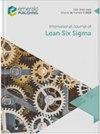从车间的工业物联网系统中培养洞察力和改进:一个通过行动学习实现工业4.0和精益互补的案例
IF 3.7
2区 工程技术
Q2 ENGINEERING, INDUSTRIAL
引用次数: 5
摘要
目的本文旨在研究制造商如何通过开发基于精益和行动学习原则的组织“学习到学习”能力,在车间工人中培养实时数据的洞察力和改进能力。第二目的是推断行动学习如何实现精益和工业4.0之间的互补性的研究结果。设计/方法/方法采用内部行动研究方法来调查制造商如何使其车间工人能够从VELUX.findings的实时数据中获得见解和改进实时数据包括开发三个连续的组织构建块,即学习学习、使用实时数据学习和学习生成实时数据以及帮助他人学习,该研究证明了学习能力是制造商寻求使车间工人能够使用实时数据采集系统来推动改进的核心结构,从而为理论和实践做出了贡献。其次,该研究概述了如何通过行动学习实现精益和工业4.0的互补性。此外,这项研究使我们能够推断出六个必要条件,使车间工人能够从实时数据中获得见解和改进。本文章由计算机程序翻译,如有差异,请以英文原文为准。
Fostering insights and improvements from IIoT systems at the shop floor: a case of industry 4.0 and lean complementarity enabled by action learning
Purpose
This paper aims to investigate how manufacturers can foster insights and improvements from real-time data among shop-floor workers by developing organisational “learning-to-learn” capabilities based on both the lean- and action learning principle of learning through problem-solving. Second, the purpose is to extrapolate findings on how action learning can enable the complementarity between lean and industry 4.0.
Design/methodology/approach
An insider action research approach is adopted to investigate how manufacturers can enable their shop-floor workers to foster insights and improvements from real-time data at VELUX.
Findings
The findings report that enabling shop-floor workers to use real-time data consist of developing three consecutive organisational building blocks of learning-to-learn, learning-to-learn using real-time data and learning-to-learn generating real-time data − and helping others to learn (to learn).
Originality/value
First, the study contributes to theory and practice by demonstrating that a learning-to-learn capability is a core construct for manufacturers seeking to enable shop-floor workers to use real-time data-capturing systems to drive improvement. Second, the study outlines how lean and industry 4.0 complementarity can be enabled by action learning. Moreover, the study allows us to deduce six necessary conditions for enabling shop-floor workers to foster insights and improvements from real-time data.
求助全文
通过发布文献求助,成功后即可免费获取论文全文。
去求助
来源期刊

International Journal of Lean Six Sigma
Engineering-Industrial and Manufacturing Engineering
CiteScore
8.90
自引率
15.00%
发文量
46
期刊介绍:
Launched in 2010, International Journal of Lean Six Sigma publishes original, empirical and review papers, case studies and theoretical frameworks or models related to Lean and Six Sigma methodologies. High quality submissions are sought from academics, researchers, practitioners and leading management consultants from around the world. Research, case studies and examples can be cited from manufacturing, service and public sectors. This includes manufacturing, health, financial services, local government, education, professional services, IT Services, transport, etc.
 求助内容:
求助内容: 应助结果提醒方式:
应助结果提醒方式:


